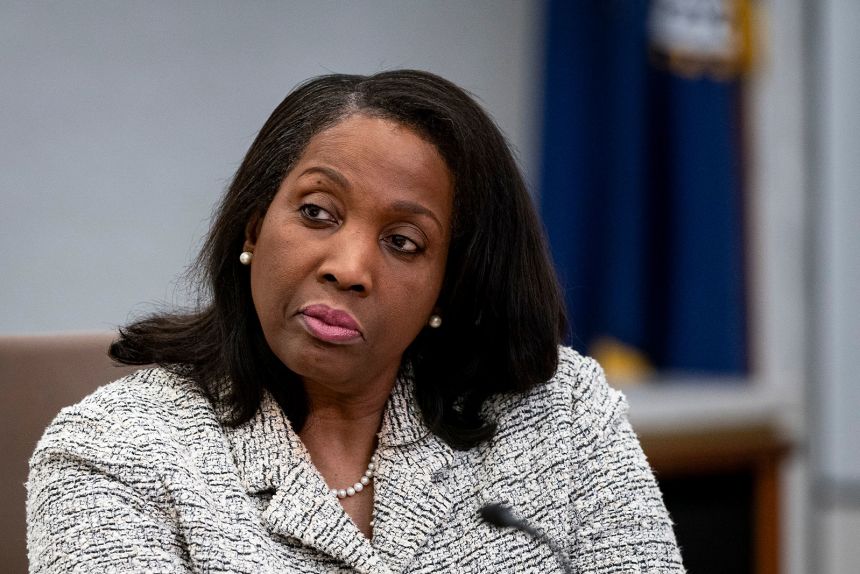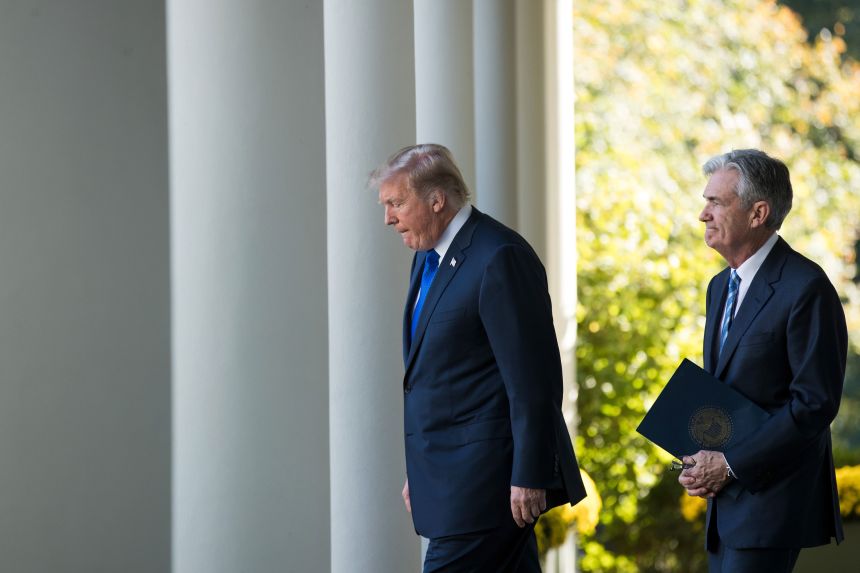Donald Trump
Federal agencies
Investing
Personal finance
Tweet
Email
Link
Donald Trump did exactly what he said he’d do.
There was no weekslong debate in the West Wing, no careful coordination with congressional allies, no intensive staff presentations detailing arcane legal authorities. There was just a social media post from the president suggesting a Federal Reserve governor should resign and then, a few days later, another one announcing she’d been fired.
In interviews with more than a dozen Trump administration officials across Washington and Republican lawmakers back home in the final days of their August recess, they all shared a similar refrain in the hours after Trump moved to terminate a Federal Reserve governor for the first time in history: They had no idea it was coming.
But several Trump officials suggested the signs were obvious. Just days earlier, the president had pledged to reporters that he’d fire Federal Reserve Governor Lisa Cook if she didn’t resign over allegations of mortgage fraud.
“The president said he’d do this if she didn’t resign,” said a Trump administration official. “Well, she didn’t resign.”
“The president is a man who sticks to his word,” a second Trump official told CNN.
Cook has denied the fraud allegations and vowed to fight in the courts. Cook and her attorney, Abbe Lowell, have argued the unproven accusations against her do not justify sufficient cause for her firing.

The White House, however, argues Trump was well within his legal bounds to oust her.
“The president absolutely has the authority to fire a fed governor for cause, and I think the accusations are serious,” White House Director of the National Economic Council Kevin Hassett told reporters Wednesday morning. He added that Cook should be placed on leave until the accusations are resolved.
“The fact that she is not doing that suggests that she is partisan and is trying to make a partisan stance, which is contrary to the independence of the Fed.”
Trump’s Truth Social post just after 8 p.m. Monday night announcing he’d fired Cook sets the stage for a historic legal showdown that could determine whether the century-old central bank retains its independence from the White House.
It also capped what multiple Trump officials have described as a remarkable sequence of events that led to the moment, beginning on August 1 with the arrival of a resignation letter addressed to Trump from another Biden-appointee to the Federal Reserve Board nearly six months before the end of her term.
Adriana Kugler’s decision to leave the Fed, which was announced publicly a few hours later that Friday afternoon, came as a surprise within the Fed and inside the West Wing, three people familiar with the matter said. Trump was thrilled, one said.
The open seat created an immediate chance for Trump to add an ally to the Fed’s seven-member Board of Governors ahead of a critical meeting next month in which the board will vote on whether to lower interest rates — a move Trump has made plain he wants.
Within a week, Trump selected Stephen Miran, his chief economist and the intellectual architect of his tariff strategy who has echoed his view that the Fed should cut rates.
Meanwhile, a Trump official at an obscure federal housing agency began sharing directly with the president accusations that Cook had committed mortgage fraud, a source familiar with the move told CNN — creating a potential legal basis to justify Cook’s removal.
Suddenly, Trump had the chance to fill not one but two extra seats on the board, giving him a potential 4-3 majority and a path to do to the Fed what he’s done to other government institutions over the past several months — bend it to his will. And all of this without firing Fed Chairman Jerome Powell, a consistent target of Trump’s ire in recent months.
Discussions with a small group of his closest advisors, some of whom made the case that the legal authority was clear, as were the allegations against Cook, created an opportunity for Trump to take action.
He decided to fire Cook, just like he said publicly he would.
Trump’s consultations included Treasury Secretary Scott Bessent, widely viewed as the most powerful of Trump’s economic advisors and, at least so far, as a stabilizing influence in a White House bent on disruption. Bessent has long sought to reassure markets about the administration’s belief in the importance of Fed independence — despite Trump’s long-running pressure campaign.
Trump has told advisors he wants to move quickly to appoint a replacement for Cook, Trump administration officials told CNN, and at a lengthy Cabinet meeting on Tuesday proceeded to publicly acknowledge the primary reason for his decision to fire Cook.
“We’ll have a majority very shortly, so that’ll be great,” Trump said. “Once we have a majority, housing is going to swing and it’s going to be great. People are paying too high an interest rate.”
Seated around the large table on Tuesday was Bessent, who, without naming Cook, made an unsolicited attempt to justify the decision to fire her.
“The Federal Reserve’s independence comes from a political arrangement between itself and the American public. Having the public’s trust is the only thing that gives it credibility,” Bessent said. “And you sir, are restoring trust to government.”
“The President determined there was cause to remove a governor who was credibly accused of lying in financial documents from a highly sensitive position overseeing financial institutions,” White House spokesman Kush Desai told CNN in a statement.

Meanwhile, Senate Republicans, many of whom have spoken publicly and often about their belief in an independent Fed, can blow up Trump’s entire plan if they don’t confirm his nominees and, should the courts side with the administration, the seat held by Cook.
The first test will play out as soon as next week, when Miran is likely to have his confirmation hearing.
Trump’s aides have quietly been laying the groundwork for weeks to ensure an accelerated confirmation process in an effort to get Miran in place before the Federal Open Market Committee’s next policy meeting begins on September 16.
People close to Trump told CNN that, unlike during his first term when he was surrounded by advisers who held him back, he is more emboldened than ever to push the bounds of his executive authority — especially on issues where he views the end result to be worth it.
Forcing out a high-ranking member of the Federal Reserve, specifically one facing allegations of mortgage fraud, meets that requirement, they argued, even if the allegations are still unproven. In conversations with multiple Trump administration officials and allies of the president, they said the underlying reason for Trump’s fixation with the Federal Reserve boils down to a key point: he views their decisions as being a roadblock to achieving his broader vision of success. And the fact that the independent bank operates wholly out of his control only adds fuel to that fire.
But the controversial decision did not happen in a vacuum. It came after months of Trump’s dissatisfaction with his inability to address an issue he views as core to fulfilling a key campaign promise: ensuring a thriving economy.
Trump’s fixation on ousting Cook also grew out of the work of Bill Pulte, the director of the Federal Housing Finance Agency, who has spent weeks fueling Trump’s exasperation with the Fed.
Along with taking his mortgage fraud accusations about Cook directly to Trump, Pulte also made the allegations public on social media and television — creating a potential legal basis to justify Trump’s eventual decision to fire her.
The accusations mirror similar allegations lobbed by Pulte at other perceived political foes. He has called for mortgage fraud investigations into Democratic Sen. Adam Schiff of California and New York Attorney General Letitia James.
In a statement, Schiff’s attorney, Preet Bharara, called the mortgage fraud investigation “the very definition of weaponization of the justice process.” Lowell, who also represents James, said the investigation against her was “the most blatant and desperate example of this administration’s carrying out the president’s political retribution campaign.”
Those investigations have been led by Ed Martin, a Justice Department lawyer who was recently named the special attorney for mortgage fraud. Like Pulte, Martin has been a reliable attack dog for the Trump administration.
The latest probe is less than a week old and hasn’t resulted in charges, let alone a conviction. But that was enough for Trump to trigger a court battle his administration has long taken pains to avoid and rupture the exceedingly fragile view that Fed independence may escape Trump’s unyielding drive to bend institutions to his will.
He did it because he said he would, on the advice of advisors who long believed he could, and with little clarity on what will happen next.
“Honestly, what the hell happens now,” a longtime senior Senate Republican aide asked in an unsolicited late-night message to CNN. “We just jumped into the unknown.”

